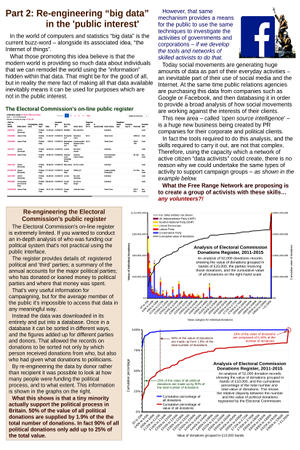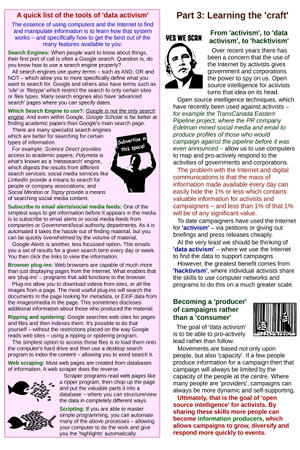Paul Mobbs & MEIR:
Open Source Intelligence for Activists
Modern campaigners use computers: For research; then collating or performing statistical analysis on data; then writing the results; then producing graphical interpretations of the results. At every stage in that chain, learning to use open source data and tools can radically change the impact that you can have.
‘Open Source Intelligence for Activists’ was a poster presentation produced in 2016 for the Free Range Network, created as a follow-up to a series of informal workshops carried out between 2012 and 2015. The three A3 panels look at different elements of using computers and data manipulation in association with campaigning.
‘Open source intelligence’ (OSInt) is an approach to information gathering that has shaken up the military and intelligence community since 2001. In parallel, in civil society, the ‘open data’ movement seeks to make information available without the restrictions of intellectual property.
Both these approaches can revolutionise activists’ approach to their campaigns. The ability to take official data and shake it up to view it differently (for example, the Electoral Commission register evaluation shown in the poster) allows the public to see issues in new, and potentially inspiring ways.
If corporations and governments are trying to restrict the ability of the public to use computers – from media companies locking up functions with ‘digital rights management’ controls, to governments weakening data encryption – then it is because these technologies give the individual the power of a large organisation; if they know how to use the technology correctly.
Open Source Intelligence for Activists grew out of skills sharing within the Free Range Network on the use of computers and the Internet, and extending the potential of that through the use of more advanced techniques – from complex spreadsheets, to databases, to scripting and programming for complex or repetitive operations.
The approach was essentially problem-solving – using computers to address the need to access large amounts of data on-line, process that into a usable format, combine it and then display it.
It is very difficult to document that in detail; there are as many ways to view this approach as there are problems to solve. Instead we chose to create a series of posters highlighting the techniques used, and one or two examples of the data/content produced with these methods.
The scope for using OSInt by activist groups is limited only by the sheer amount of data available today, and the group’s capacity to process that data. If you would like to discuss this issue in more detail, and perhaps organised some workshops tailored to your specific needs, please get in touch.



